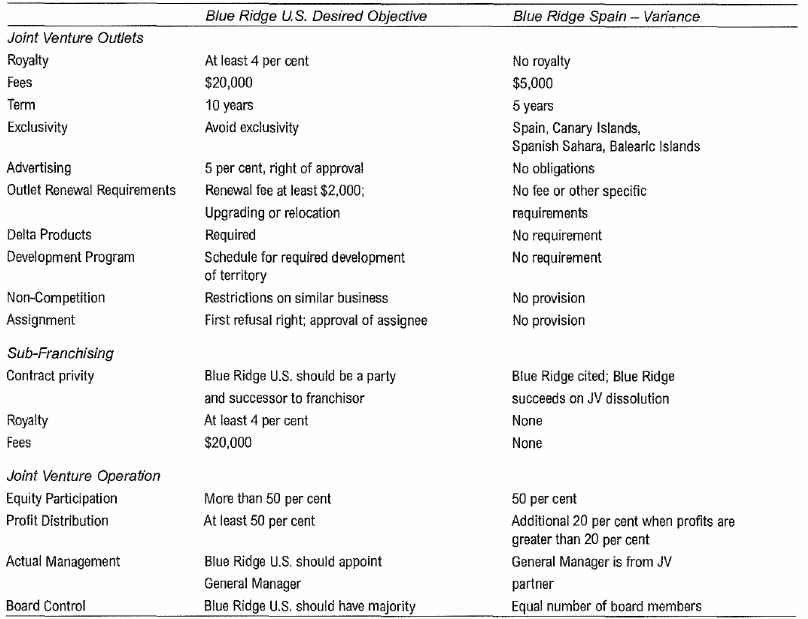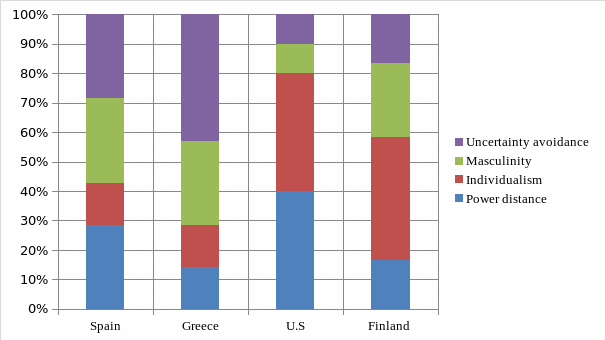Case
Developing a plan to dissolve partnership between Blue Ridge Restaurant and Terralumen.
Key Business/Management Issues
The top managers at Blue Ridge Restaurant are keen to achieve rapid growth in Spain. To achieve this aim, they have hired Mikael Sodergran, a young, inexperienced executive as the regional vice president instead of Yannis Costas who has over ten years of experience working in this region. Sodergren has failed to come up with effective strategies that can ensure there is a successful partnership strategy between Blue Ridge Restaurant and Terralumen. This has led to a series of disagreements and unethical sabotage plans at the head offices of Blue Ridge to bankrupt the partnership venture. After the unethical attempts by the top executives to buy out the Spanish partner failed, they have decided to dissolve the partnership after the effort put in place by Yannis Costas to achieve success in this market (Lane, Maznevski, Distefano, & Dietz, 2009). Detailed facts about Blue Ridge Spain are given in the figure below.

Goal
The goal of the top managers of Blue Ridge was to achieve quick success in the Spanish market, just as it was happening in other parts of Europe. On the other hand, the goal of managers at Terralumen was to achieve slow but sustainable growth in this turbulent market.
Key Players
Yannis Costas, who is the European managing director of Blue Ridge Restaurants, Donald Kinsley, the company’s international president, and Mikael Sodergran, the regional vice president.
MBI Analysis
Cultural Models and Dimensions selected for MBI
In order to understand this case, it will be necessary to analyze the cross-cultural values in the four countries under discussion (Hodgetts, 2002). The individuals who are involved in this business case are from the United States, Spain, Finland, and Greece. Understanding the cross-cultural dimensions of these four countries may help in explaining some of their unique characters presented in the case. This can be done using the Hofstede Cultural Dimensions Theory. As shown in the graph below.

The data shown above were computed based on the information provided about the three countries. This can be summarized as shown below:
- People from Finland are individualistic in nature. They prefer spending much time doing some serious business.
- Americans are highly individualistic and do not fear uncertainty when undertaking a business project. They are risk-takers. They give very little reference to the issue of collectivism.
- The Spaniards detest individualism. They value friendship and family ties. They are also slow when it comes to risk-taking.
- The Greeks cherish family values and friendship but always tend to avoid cases of uncertainty.
Mapping
The cross-cultural analysis done above may help in explaining some of the specific behavioral patterns demonstrated by some of the key people in this firm. It is clear that Americans are very individualistic. They only want personal success, giving very little concern about the issue of friendship (Punnett, 2013). This cultural pattern of the Americans makes it easy to understand why the top American managers were planning to sabotage the operations of the Blue Ridge Restaurant in Spain for personal gains. It confirms that they do not care about other people, and when given the opportunity, they will take advantage of others. They are also very keen on getting quick success in their business ventures. That is why Dryden, an American, was keen to bring the partnership to an end because his expectations were not met.
We see him proposing ambitious measures on how to promote rapid expansion in entire Europe. This risk-taking attitude has its strengths and weaknesses. The strength is that it will enable the firm to expand its market share very rapidly in the international market. However, the biggest weakness is that the strategy can be chocked financially. Rapid expansion may mean massive expenditure, and if a firm lacks a strong financial base, the new projects can easily fail, leading to massive loss of resources. Masculinity is another issue that can be detected in this case, given that it is based on a story when women in America were struggling to make it through into the corporate world (Lane, 2011). The top management of this American firm is dominated by men.
The Spanish are very reserved, but they value friendship and family values (Luthans & Doh, 2015). This explains why the top managers at Terralumen, a Spanish company, had to develop a friendship with the Americans who were heading the Blue Ridge expansion plans before accepting the partnership proposal. After accepting the partnership, these Spaniards make a concerted effort to ensure that the firm achieves success in Spain. They do not want to disappoint their American friends. Individualism is something uncommon among these people. Although the top managers of Terralumen had the power of attorney to make critical decisions that would have benefited them at the expense of the Americans, they always remained fair, aiming at achieving a common goal for all the parties involved. They value collectivism so much in all that they do.
The Finns are task oriented individuals who have very little time for idle or personal discussions (Lane & Maznevski, 2014). This is best demonstrated by Mikael Sodergran, the regional vice presidents. He turned down all the dinner invitations made by Yannis Costas, insisting that it is better to spend time doing something constructive. He even rented an apartment within the same building where he had the office just to spend more time working. The Finns are also individualistic in nature. Mikael made no attempts to make friends or understand the people he was working with at this firm. He was too official to be approachable, and the only thing one could discuss with him is business. To him, the issue of collectivism is a waste of precious time that can be spent elsewhere.
The Greeks are very friendly people who value family ties. They believe in collectivism. That is why Yannis Costas was interested in preserving the relationship between Blue Ridge and Terralumen. He appreciates that developing this relationship was not easy hence it was necessary to preserve it as long as it remained profitable to both parties. They also believe on the issue of hierarchy so much. That is why Mikael Sodergran felt disappointed when a young inexperienced man was promoted to a position he believed should have been assigned to him. His respect for people in authority enabled him to work with this inexperienced superior without disobeying him in any way.
Bridging
To prepare, Costas will need to change his mentality about the whole partnership. He will need to fight the emotions he has towards this partnership and be ready to follow the decision of the top leaders of his firm. It is true that the senior managers were unreasonable in their demands and even tried engaging in unethical behavior. It is also true that he made a fight to promote an ethical practice and to protect the partnership, but these executives had selfish interests based on the short-term gains. Given that he lost this fight, he should redefine his focus and find ways of achieving success in other areas. He should avoid bitterness that may hinder his judgment. He should find a way of motivating other parties that may be hurt by this decision to move on.
To Decenter, Costas may need to put into perspective the reasons why his superiors, especially Mikael and Dryden arrived at their conclusion of ending the partnership. It may be possible that the two leaders were under pressure to deliver good results. For instance, he should look at the decision made by Mikael to rent an apartment in the same building that housed his office. Inasmuch as the Mapping done above makes one to believe he is a workaholic and individualistic in nature, it cannot reach the extent where one sacrifices his social life completely. Mikael has locked himself out of the social world to achieve success. He must be under pressure. Therefore, Costas should be more understanding towards him.
To re-center, Costas and his superiors should find a common ground. Costas should make an effort to discuss the issues affecting this firm with his superiors. All of the relevant stakeholders should come together and agree on an approach that can be taken in this expansion program. Costas should feel free to give his suggestions and engage actively in the implementation of strategies that would bring an overall success to the firm in the European markets.
Integrating
It will be important to address the differences identified in the case in order to promote performance. This will require integration of skills by all the stakeholders involved. The first skills will be teamwork. Currently, this skill is completely lacking at this firm. The individualism has prevailed over collectivism. This should be changed. These managers must realize that they have a common goal and must work as a unit to achieve it. The second value embracing effective communication skills.
There is a clear delink between Costas and his immediate superior, Mikael. This issue should be addressed as soon as possible. The two executives must find ways of spending time together and addressing the issues of concern to this firm. Finally, it will be necessary for the executives to embrace negotiations as a way of solving conflicts. In this case, the superiors are just issuing instructions without paying attention to the feelings of their junior officers. This should not be the case anymore. They should embrace active dialoguing when coming up with major decisions.
Excel Cultural Scenario Map
Scenario:
Costas has been instructed by his immediate superior to develop a dissolution strategy within two weeks. However, he is convinced that he can still save the partnership. He needs to find a way of convincing the superiors to consider other alternatives.
Social Competency:
Aiming to change the decision of the superiors about the partnership.
Preparation Steps:
- Prepare an appropriate MBI analysis based on the current situation
- Conduct a review of the cultural information about the four countries
- Make a point to act as soon as possible to make the superiors change their mind on the issue
Recommendations for a Business Solution
It may not be easy for Costas to convince the top managers at Blue Ridge that after 16 years of waiting, this partnership is now bound to bring positive results at a time when a decision has been made to dissolve it. It is recommended that the top managers should give Costas a chance to prove that this is indeed possible. The firm should give Costas and all the stakeholders interested in seeing a continuity of the partnership in a period of one year to demonstrate if indeed it is the right decision to for the firm.
References
Hodgetts, R. M. (2002). International Management: Culture Strategy and Behavior. Richard d Irwin.
Lane, H. W. (2011). International management behavior: Leading. London: Springer.
Lane, H. W., & Maznevski, M. L. (2014). International management behavior: Global and sustainable leadership. Hoboken: Wiley.
Lane, H., Maznevski, M., Distefano, J., & Dietz, J. (2009). International Management Behavior: Leading with Global Mindset. Hoboken: Wiley.
Luthans, F., & Doh, J. P. (2015). International management: Culture, strategy, and behavior. New York: Springer.
Punnett, B. J. (2013). International perspectives on organizational behavior and human resource management. New Delhi: McMillan.